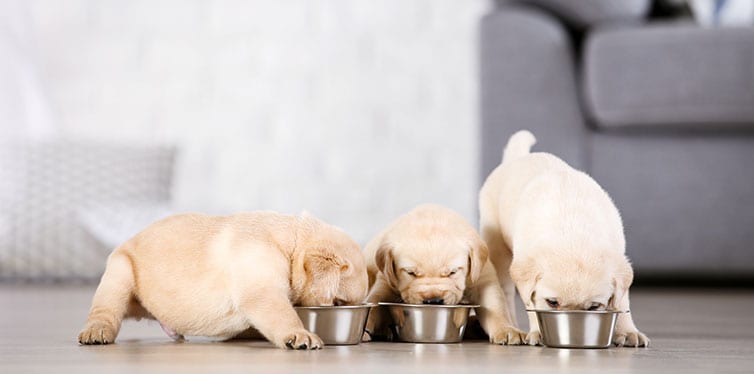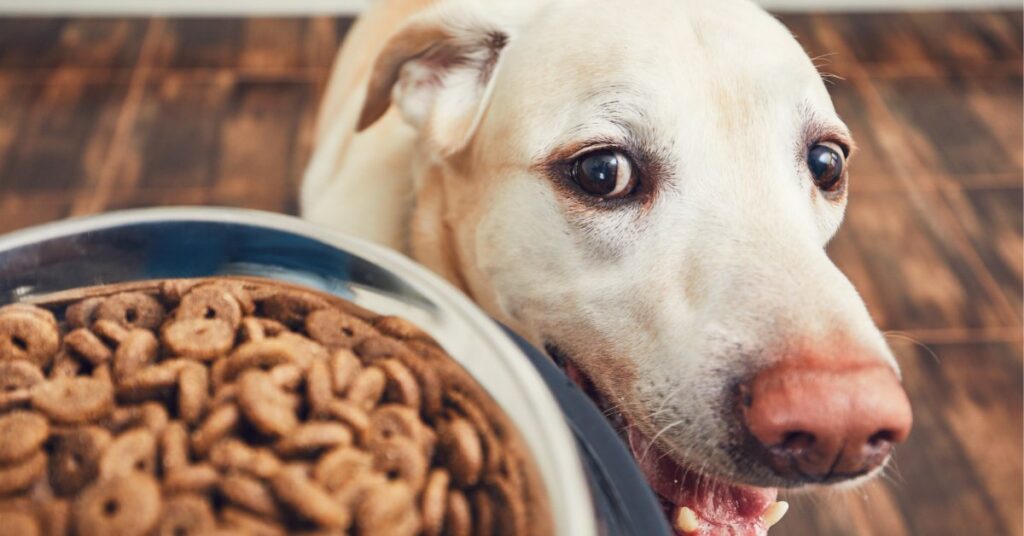There is no doubt that Labrador retrievers are incredibly energetic pets, making them an excellent choice as family pets. To live a healthy life, they must do a great deal of exercise and physical activity. Considering this, you should provide them with a Labrador Retriever Nutrition and Diet that suits both their active lifestyle and the Labrador breed.
Having different needs is part of what makes every lab unique. A lab that requires more energy may have different needs than a less energetic lab. Labradors may need less food as their activity levels decline as they grow older. In today’s world, there is an abundance of different food options for dogs, so you are certain to find a feeding method that is perfect for your pet.
It is important to keep in mind that one of the most important aspects of feeding Labradors is nutrition. In your role as a pet owner, it is your responsibility to make sure that your Lab is getting all the nutrients he needs through the food he eats. In other words, it means making sure that they receive a Labrador diet that is balanced in terms of amount and proportion.
The right amount of food is not nearly enough when it comes to feeding your Labrador retriever. Furthermore, you also have to feed them the right amount of nutrients in the right proportions. Since Labradors have different nutritional needs, it can be challenging to figure out the proportions to feed your little one based on their nutritional needs.
Throughout this article, we will discuss reasonable and ideal benchmarks that you can set for your Labrador’s nutritional requirements.
Labrador Retriever Nutrition and Diet
For Labradors to thrive and be as energetic as they should be, they must be fed a well-balanced diet. There is no doubt that a lab’s dietary requirements are as complex as those of a human being. For this reason, they must be provided with the nutrients they require to grow properly.
The following are some of the basic nutrients that your Lab will need in his or her diet:
Protein
In other words, how much protein does a Labrador need?
Well, proteins help grow your little Labrador’s muscles, so they are a good thing to have around. Therefore, in general, your Lab should consume a lot of proteins in their diet. You should aim to supply them with about 20-25% of their daily calorie intake as protein.
For Labrador retrievers to maintain and increase the strength and health of their muscles they need high-quality proteins. This is because they are incredibly energetic and use their muscles a lot. As proteins take a long time to digest, they also help Labradors to feel fuller, since they take a while to digest. It is a good thing if your Lab feels full because it is known to be a voracious eater who is prone to becoming obese as a result of their eating habits.
Taking in carbohydrates
As I mentioned earlier, Labradors are very energetic dogs. It is, therefore, crucial that they have a diet that supports their high level of energy.
Carbohydrates give Labrador Retrievers the energy that they need to continue exercising and playing around all day long. Depending on how much your Labrador dog exercises, you will need to adjust the number of carbohydrates he consumes.
Fats
Although it may seem counterintuitive, fats are still one of the most important dietary requirements that your Lab needs to be healthy. In addition to providing your Lab with energy, fats are an important component of the animal’s diet. On top of that, fats also play a crucial role in building nervous tissues in your dog, and will also support them in times of inflammation when they are recovering from injury.
Moreover, some essential fats may also contribute to keeping a Labrador’s coat healthy and shiny. Nevertheless, it is important to highlight the fact that fats should be provided in moderation. After all, moderation and proportion are crucial in keeping your Labrador happy and healthy.
Vitamins and minerals
There are several vitamins and minerals which are crucial to the growth and development of your Labrador. These vitamins and minerals are essential for the make-up of your dog’s bones and help in his metabolism.
In the case that you’re looking for the best vitamins for Labs, this article from WebMD may be of help to you.
Water
Water plays a major role in Labrador health on a deeper level than just survival.
The first thing that water does is help regulate body temperature. The first thing that water does is help distribute nutrients throughout the body. To ensure that your dog always has access to water, you should provide a bowl with water for your Labrador retriever.
Calorie needs a Labrador
An online calculator, such as the one you can find on the site, is a great place to start for pet owners who want to know how many calories their dogs need.
Generally, an adult Labrador will have to consume about 1500 calories, give or take a little bit. How much food they consume will depend mostly on how active they are. For example, an old Labrador will consume fewer calories than the amount recommended by a nutrition calculator for dog food since they move around less and do not need as much energy.
Due to mobility problems, a Labrador can also require a lower amount of food than the average because they cannot move around properly. The opposite applies to pregnant and nursing Labradors. They will need to consume more calories than the average active adult Labrador.
The point to remember here is that the food your little Lab consumes will vary based on several variables, such as their weight, size, age, health, level of activity, and level of energy, to name a few. A good thing that you can do regarding the caloric needs of Labradors is to consult your vet and ask them how many calories your dog should consume each day.
We would like to thank you again for your cooperation and observation on this matter. You may need to feed your Lab less next time if you notice they are not eating all the food that you are giving them or vice versa if you notice that they are not eating all the food you are giving them.
You should, however, keep in mind that different kinds of food contain different amounts of calories. Wet foods, on the other hand, will have more calories than dry foods as they will have more moisture in them. While going by amounts is essential, knowing the calorie content of the type of food you are feeding your dog is equally important.
The topic of treatments is a completely different matter. Dog owners should take steps to mitigate the possibility of their Labradors becoming obese, as these dogs are prone to becoming overweight. During mealtimes, treats contribute to your dog’s overall calorie intake, so you need to subtract whatever treats you give them during those times from the calorie intake.
The Best Foods for Labradors
It is a known fact that there are many Labrador diets available on the market today. In fact, as a Lab owner, you can provide them with dry food, wet food, or even some home-cooked meals.
You will have to choose the feeding method that fits your lifestyle the best if you wish to feed your Labrador retriever. Some people cannot cook their pets meals since they lack time and resources. Not only does it get expensive, but knowing the exact proportions to cook to keep your dog healthy will require you to learn a great deal of information. Make sure you stay away from these foods for your Labrador.
The process of determining the best ingredients to cook with and in what proportions is not an easy one. Because of this, most pet owners resort to using commercially made pet food.
The fact that a lot of food is produced commercially does not necessarily mean that it is bad. If it is a part of your Labrador’s basic diet and nutrition, then it can be a portion of really good food for your Labrador.
However, you should always make sure that the food you buy for your Lab provides them with the nutrients that they need by checking the packaging of the food. As a result, you will be sure that the food you buy is specifically tailored to suit the requirements of your Laboratory and their current energy levels.
It is common for pet owners to stray away from this advice, but many dog owners find it appealing to cook their dog food for their pets. Those of you who are one of them, here are a couple of meals that your Labrador would appreciate if you made them:
- Meat that is of human quality such as poultry, meat, or fish.
- Dairy products such as low-fat yogurt and eggs.
- Foods that contain complex carbohydrates, such as sweet potatoes and brown rice. (Pro tip: do not consume corn since it can be hard to digest.)
- Carrots, green beans, and cauliflower are good vegetables to consume. Even though dogs are carnivores, fruits and vegetables should still make up a reasonable portion of their diet.
This is just a small list of a few of the best foods you can give to your Labrador. There are many more that you can explore to best suit your needs.
Don’t overfeed your lab
Since you are an owner of a Labrador Retriever, we understand that you want only the best foods for your pet. If you want to take care of your Lab, make sure that you do not overfeed them with food since they tend to eat a lot and do not know when to stop.
According to studies, obesity is the leading cause of illness in Labradors. The presence of obesity in Labradors can result in a multitude of other diseases and illnesses, such as heart disease or diabetes. For this reason, overfeeding Labradors should be avoided at all costs.
To ensure that your Labrador remains healthy and strong, you will need to carefully monitor the amount of food that he is eating. You should also keep in mind that obesity is also a form of malnutrition. When it comes to maintaining your Lab’s dietary intake, you will have to cut back on treats and other extras that you are likely to be fond of adding to your diet.
In conclusion
It is a complex subject to jump into at the outset when discussing the diet and nutrition of Labradors. The good news is that by conducting adequate research, you can give your dog the level of care and nutrition that they require to grow strong and healthy.
While all of the information written in this article was well-researched, it cannot replace the personal advice you can receive from your veterinarian in the event of an emergency. The best advice we can give you is to reach out to them since they will know what are the best foods for your Labrador based on their medical history and their personality.
You should try not to get overwhelmed by the sheer number of things to think about. It will eventually be possible for you to come across the perfect food that will give your Labrador the best diet and nutrition that is suitable for them and their individual needs.
What are the nutritional requirements for a Labrador?
50 – 55 pound Lab, feed: 240 – 265 grams per day. 60 – 65 pound Lab, feed: 270 – 300 grams per day. 70 – 75 pound Lab, feed: 300 – 335 grams per day. 80 – 85 pound Lab, feed: 330 – 365 grams per day.
What are a dogs nutritional requirements?
Scientific research has shown that an adult dog’s daily diet can contain up to 50% carbohydrates by weight, including 2.5–4.5% from fiber. A minimum of approximately 5.5% of the diet should come from fats and 10% from protein. Petfood labels do not generally list amounts of essential nutrients in grams.
What should I not feed my Labrador?
Foods poisonous to Labradors are chocolate, macadamia nuts, walnuts, onions, garlic, leeks, grapes, raisins, alcohol, caffeine, salt, and products sweetened with xylitol. Some less well-known foods toxic to Labs are raw potatoes, yeast dough, green tomatoes, and moldy food.
Can Labrador eat rice?
The answer is yes. You may not even realize it, but rice is an ingredient sometimes found in commercial dog foods. In fact, if you ask many pet owners what they feed their dog when he’s sick, they’ll likely tell you that white rice is a part of their pup’s diet.
Can Labradors have bananas?
Is Chicken Good for Labrador?
Cooked chicken is a healthy food that is safe for most dogs to eat. Chicken is one of the most common ingredients used in dog foods, as it is an excellent source of protein, which your dog needs to stay healthy. You can feed your dog chicken on its own or combine it with his regular food.
Can a Labrador eat bread?
Dogs can safely eat bread in much the same way as humans—in moderation. Plain white and wheat bread is generally safe for dogs to eat, provided they don’t have any allergies, and it usually does not cause any stomach upset.
Is milk good for Labrador?
Milk is a good source of nutrients like protein and calcium, as well as important vitamins like D and B12. But your dog gets these from his regular food anyway. Moderation is key when it comes to dogs and milk. Adult dogs should drink plenty of water, and can be given milk in small quantities as an occasional treat.
Is boiled egg good for Labrador?
Yes, eggs are very good for dogs. The nutrient composition of eggs closely resembles the natural diets of dogs prior to the introduction of the kibble that many dogs are fed today. Whole eggs contain plenty of vitamins, minerals, Omega 3, healthy fats, and other nutrients.



